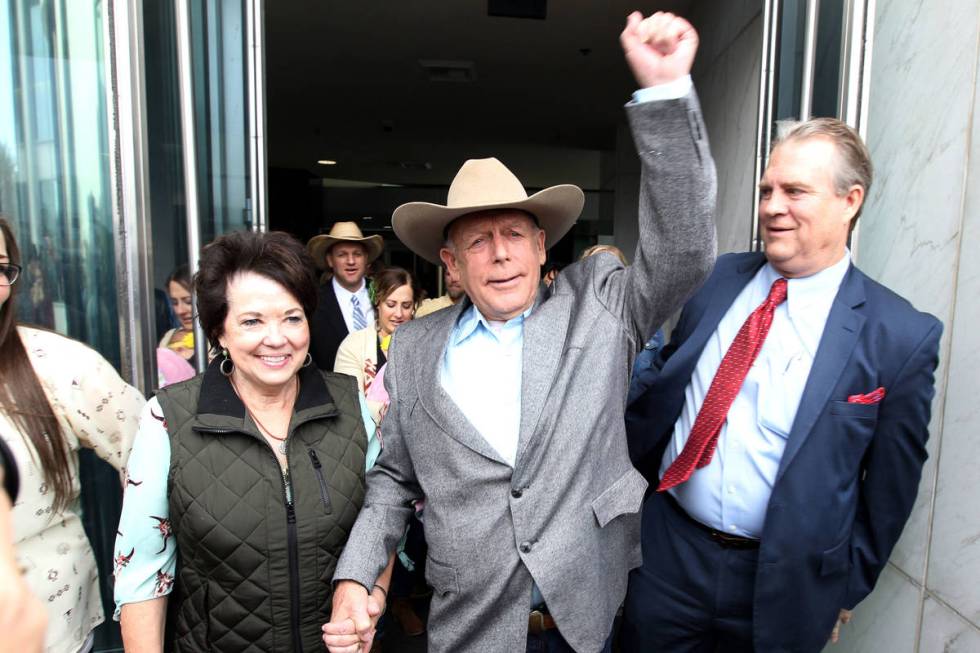Prosecutor calls dismissal of Bundy case ‘extreme sanction’

A federal prosecutor acknowledged missteps in the trial of rancher Cliven Bundy and others but asked the 9th U.S. Circuit Court of Appeals on Friday to give the government another chance to pursue charges tied to the 2014 standoff near Bunkerville.
More than two years after a decision from U.S. District Judge Gloria Navarro to throw out felony conspiracy and weapons counts against Bundy, two of his sons and another man, Assistant U.S. Attorney Elizabeth White admitted that the Department of Justice “fell short” in turning over evidence at trial.
“In undertaking an enormous task, we missed a few things,” White argued before a three-judge panel via videoconference. “We overlooked a document here, or we didn’t appreciate the potential relevance of a document there. … But falling short simply does not warrant the extreme sanction of dismissing a criminal indictment.”
Judge William Fletcher briefly interrupted White’s argument, saying the government “fell short on a series of things,” which could have been attributed in part to the FBI and other investigative authorities. “But if it’s being withheld before it gets to you, that’s still a problem for the government.”
Before Navarro’s January 2018 dismissal, which the government appealed, she found that the federal government improperly withheld evidence. Prosecutors had willfully withheld video surveillance, maps and FBI interview information in violation of due process required by the U.S. Constitution, she said.
Bundy attorney Larry Klayman, a nationally known conservative lawyer, pointed to testimony in the trial that he said showed misconduct from the prosecutors and entrapment on the part of authorities against the Bundy family.
“There was flagrant abuse here, gross abuse,” he said. “And Judge Navarro made the exact correct decision.”
Assistant Federal Public Defender Amy Cleary, who represents Bundy’s sons, Ammon and Ryan, with Montana militia leader Ryan Payne, argued that all of the evidence that prosecutors withheld would have supported the defendants.
She said Navarro told the government several times during the two months of trial that she was concerned about the evidence that was not turned over.
“That is why this is such an egregious case,” she said. “And it’s a troubling case, and it’s a rare case.”
Cliven Bundy has been fighting the government for more than 25 years over grazing rights for his cattle. He, his sons and Payne were considered the leaders of what the government alleged was a massive conspiracy to assault law enforcement officers a few miles from the Bundy ranch.
An armed standoff occurred after federal agents tried to execute a court order to round up Bundy’s cattle on federal land. The encounter ended without injury after Bureau of Land Management officers called off the roundup.
Seven other defendants had pleaded guilty without having the benefit of the favorable evidence. Two more defendants were convicted at a separate trial in 2017, including Todd Engel, whose lawyer argued on Friday for an appeal of his conviction.
White suggested that Navarro went too far in her ultimate decision in the Bundy trial, and said prosecutors had not intentionally tried to misdirect the defendants and jurors. A new trial, she argued, would “certainly cure” problems that arose in late 2017 and early 2018.
“Even if this court concludes that the government should have turned over those documents earlier, there is simply no basis on which to conclude that our failure to do so constituted flagrant misbehavior that resulted in substantial prejudice to the defense that could not be cured by a remedy less than dismissal of the criminal indictment,” White said. “And it’s certainly not so grossly shocking or outrageous as to violate the universal sense of justice.”
^
Contact David Ferrara at dferrara@reviewjournal.com or 702-380-1039. Follow @randompoker on Twitter.